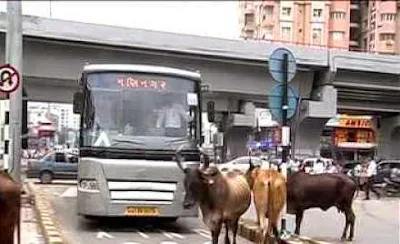Lack of transparency, accountability pulls Ahmedabad's ranking to No 10 in 21 Indian cities surveyed
A recent study, “Annual Survey of India’s City Systems (ASICS) 2014: Shaping India’s Urban Agenda”, has found that Ahmedabad ranks No 10th in a group of 21 selected cities selected for survey ascertaining quality of life survey across India. Claiming to an “objective evaluation of city-systems", taking into account "complex, mostly invisible factors such as laws, policies, institutions, processes and accountability mechanisms that strongly influence quality of life in our cities”, the survey, carried out by a high-profile Bangalore-based NGO, Janaagraha, defines “quality of life” to mean “both quality of infrastructure and services, and quality of citizenship.” The only other city from Gujarat taken up for survey is Surat, which scores No 7 -- better than Ahmedabad.
The survey – whose results were evaluated by a group of elite jury consisting of Arun Maira, a former Member of the Planning Commission; Adi Godrej, chairman of Godrej Group; Baijayant Panda, a Member of Parliament from Kendrapara constituency, Odisha; Ireena Vittal, former partner, McKinsey & Co and an urban expert; and Dr M Ramachandran, former chief secretary of the Government of Uttarakhand – surprisingly finds that Kolkata ranks No 1 in “quality of life”. Interestingly, other cities which rank better than Ahmedabad are Thiruvananthapuram, Bhopal, Patna, Delhi, Pune, Raipur, Surat, Pune and Mumbai, in that order.
Details of separate categories of the survey suggest that Ahmedabad ranks No 13 out of 21 cities in the “urban planning and design” category, with Delhi found to be No 1 city on this score. In the category “urban capacities and resources”, Ahmedabad ranks No 5, with Delhi, again, ranking No 1. In the category “empowered and legitimate political representation”, Ahmedabad ranks No 8, with Kolkata being No 1. In each of these three categories, the other city of Gujarat for which the survey has been carried out, Surat, ranks almost equal to Ahmedabad -- No 13, No 7, and No 8, respectively.
The worst performance of Ahmedabad was found to be in the forth category, “transparency, accountability and participation”, in which it ranks No 14, with Thiruvananthapuram ranking No 1. This is the only category in which Ahmedabad’s score, 2.9, on a scale of 10, is found to be worse than the all-India average, 3.3. The main points of analysis in this category include open government, citizen services, ombudsman, audit, and participation. The study finds it unique that Thiruvananthapuram was the first to implement the public disclosure law, which “is fairly on the lines of the Model Act”, and it is the only city whose local body has “an ombudsman to fight corruption at the lowest levels.”
Pointing towards the importance of the survey, the study says, “Over the years urban residents have become immune to living with overflowing garbage in their backyards, arduous commutes to their workplaces, shabby housing and minimal social or cultural outlets. These day-to-day travails point to a deeper malaise within our cities - that of poorly-resourced city governments and badly managed cities. It is time to move the lens away from the challenges that we encounter and delve deep into the systemic shortfalls that lie at the root of these inefficiencies.”
The study claims that ASICS has become an “essential benchmark to evaluate leadership and resources across Indian cities”, adding, “As the union, state and city governments across the country grapple with urban challenges, band-aid solutions will no longer suffice. India’s roadmap of urban reforms is clearly visible by looking at the ASICS scores of India’s top 21 cities.” Interestingly, the study seeks to compare Indian cities with New York and London, which they consider as “benchmark”. The study believes, “Deep systemic reforms that have a coherent canvas are needed – and the city-systems framework provides such a canvas.”
Pointing towards the importance of the survey, the study says, “Over the years urban residents have become immune to living with overflowing garbage in their backyards, arduous commutes to their workplaces, shabby housing and minimal social or cultural outlets. These day-to-day travails point to a deeper malaise within our cities - that of poorly-resourced city governments and badly managed cities. It is time to move the lens away from the challenges that we encounter and delve deep into the systemic shortfalls that lie at the root of these inefficiencies.”
The study claims that ASICS has become an “essential benchmark to evaluate leadership and resources across Indian cities”, adding, “As the union, state and city governments across the country grapple with urban challenges, band-aid solutions will no longer suffice. India’s roadmap of urban reforms is clearly visible by looking at the ASICS scores of India’s top 21 cities.” Interestingly, the study seeks to compare Indian cities with New York and London, which they consider as “benchmark”. The study believes, “Deep systemic reforms that have a coherent canvas are needed – and the city-systems framework provides such a canvas.”



Comments